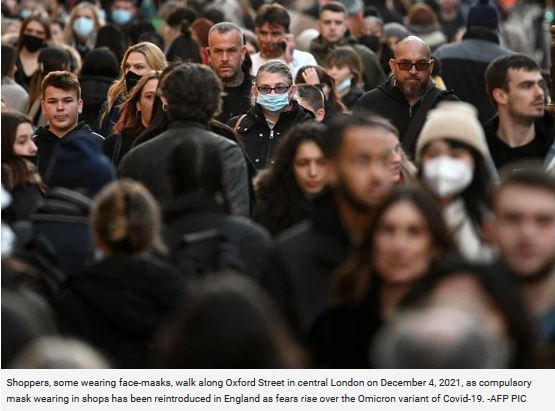Covid-19 shows that humanity has failed to prepare for catastrophes
Emeritus Professor Tan Sri Dato' Dzulkifli Abdul Razak
Opinion - New Straits Times
December 6, 2021
AS the latest Covid-19 variant, Omicron, hits a world shaken by the pandemic, the word "doom" comes to mind.
It is not just the feeling that we have been cornered yet again by another variant of concern with little to go by.
It is also about a book by the same title, Doom: The politics of catastrophe, recently released by prolific historian Niall Ferguson.
According to Ferguson, who also penned Civilization: The West and the Rest: "All disasters are, at some level, man-made political disasters, even if they originate with new pathogens."
This is indeed a useful and timely reminder to all.
The former points to the "sharp" end perpetrated by people who are in direct contact with human system interface.
Frontliners, for example.
They are said to either be skill-based, rule-based, or knowledge-based workers who are closest to the victims.
The latter, at the "blunt" end of the system, are less apparent.
They include the "delayed consequences of technical and organisational actions and decisions, such as reallocating resources, changing the scope of a position, or adjusting staffing".
In the case of the pandemic, it could be described as "active" in the early part, but increasingly gravitating to "latent" in its later stage, with the emergence of
Omicron being the latest example.
In other words, it suggests that several governments have not been effective in approaching disasters within this broader framework, making it clear that democratic institutions by themselves are far from a sufficient safeguard against disasters.
In particular, "those that are not normally distributed, but follow power-law distributions — regardless of whether we insist on classifying them as natural or man-made".
As recently as last year, the responses of many developed countries, including the United States and European Union, to a novel "Wuhan" virus from China were poorly managed, despite the experiences from the outbreaks of SARS and MERS not too long ago.
The worst losers are populist governments, which result in the deaths of million of lives to Covid-19.
This is not taking into account the potential conflict between
superpowers with the tendency to bring more disasters to
the world.
One source is the controversy about the origin of the pandemic, which has still not been fully explained and is stymieing efforts to better prepare for future challenges, including new variants.
Then there are issues involving vaccine development, distribution and use that can further distort the two types of errors cited above with a calamity of unexpected proportions.
Ferguson's explanation of the occurrences of disasters highlighted why bureaucratic and complex systems are making things worse despite experience with handling similar situations in the past.
He argued that there may be more profound "pathologies" at work.
Issues such as vaccine diplomacy and vaccine nationalism, as well as terrorism, may be among them.
Simply put, it is worth recalling: "Most disasters occur when a complex system goes critical, usually as a result of some small perturbation."
It is said that the point of "failures" — if it can be located — is more likely to be in the middle rather than at the top of the organisation chart.
Therefore, governments must become less bureaucratic if we are to avoid the impending doom of irreversible decline.
After all, pandemics are notoriously difficult to call, because so many variables exist across and within nations.
The book reminds us that this is not the first time that humans have had to deal with catastrophic events.
Each time, allegedly, throughout the ages, humanity has failed to prepare for catastrophes, whether natural or human-made.
This time seem to be no different!
The writer, an NST columnist for more than 20 years, is International Islamic University Malaysia rector

